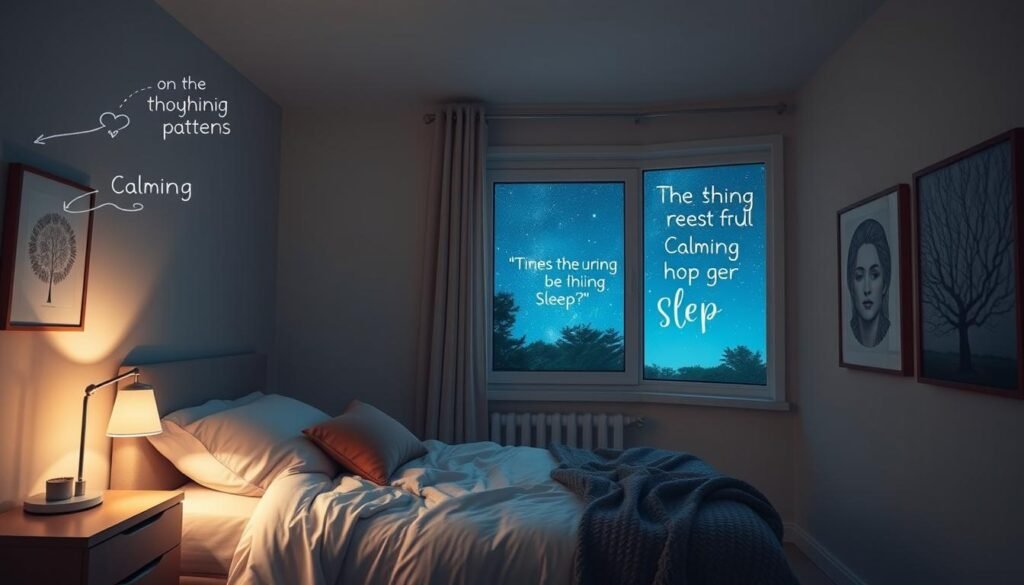About 30% of adults in the United States say they have trouble sleeping. Around 10% of them actually have an insomnia disorder. This problem is often linked with anxiety, making a hard-to-break cycle. It’s important to know how to treat insomnia caused by anxiety. Doing so can really help with sleep and mental health.
People with anxiety disorders often struggle to get good sleep. Recognizing and treating this sleep disorder is a key part of overall care. It shows why it’s important to find ways to manage insomnia due to anxiety. In this guide, you will learn how to handle sleep problems related to anxiety. This can lead to better sleep and improved health.
Key Takeaways
- Insomnia affects nearly 30% of adults, with significant overlap with anxiety disorders.
- Addressing anxiety is pivotal in effectively managing insomnia symptoms.
- Comprehensive treatment plans should consider both insomnia and anxiety disorders.
- Cognitive Behavioral Therapy is a highly recommended initial treatment.
- Various medications are available for both short-term and long-term insomnia management.
- Lifestyle adjustments can play a vital role in improving sleep quality.
Understanding the Connection Between Insomnia and Anxiety
Insomnia and anxiety are closely linked, with a high number of anxious people also struggling to sleep. This relationship impacts millions worldwide. So, we need treatments that focus on both parts at the same time.
Prevalence of Insomnia in Anxiety Disorders
Studies show that anxiety disorders come with a lot of insomnia. Disorders like PTSD, GAD, and panic disorder often cause sleep problems. A study on 326 people getting therapy for anxiety found many had insomnia, even after therapy.
Between 24% to 36% of people complaining of insomnia also have an anxiety disorder. This shows how common insomnia is in anxious individuals. It’s crucial to treat both to get better overall.
The Role of Insomnia in Diagnosing Anxiety Disorders
When diagnosing anxiety disorders, insomnia is a key symptom to look out for. Conditions like GAD and PTSD include sleep issues. Doctors need to ask about sleep to diagnose insomnia accurately. Treating sleep issues can hugely improve life and mental health.
Treating Insomnia Secondary to Anxiety
Individuals with anxiety often struggle with insomnia. Treating it successfully involves various strategies. These include medication, cognitive-behavioral therapy (CBT-I), and changing certain lifestyle habits. Together, they tackle the complex nature of anxiety-related insomnia.
Effective Treatment Options
There are many ways to treat insomnia when it’s linked to anxiety. Medication is usually the first step, focusing on those approved for insomnia. Nonbenzodiazepines are often chosen for their quick action and fewer side effects. The FDA approves a variety of sleep aids, including tricyclic antidepressants and a melatonin agonist. This lets doctors customize treatment based on the patient’s needs.
Cognitive-behavioral therapy for insomnia (CBT-I) is also highly valued. It helps people change the behaviors and thoughts that keep them awake. Making simple changes in daily habits can also make a big difference. Advice often includes cutting out daytime naps, avoiding caffeine before bed, and establishing a soothing pre-sleep routine.
Importance of Treating Comorbid Conditions
Treating both insomnia and anxiety together is key. Studies show a significant link between anxiety, sleep problems, and up to 36% of anxiety sufferers experiencing insomnia. Addressing both can lead to better results. Untreated sleep issues can make anxiety worse. Doctors look for any medical conditions, medications, or substances that could affect sleep.
| Condition | Importance of Treatment |
|---|---|
| Anxiety Disorder | Treating anxiety reduces the risk of insomnia and enhances overall mental health. |
| Insomnia | Effective insomnia treatment can alleviate anxiety symptoms, creating a positive feedback loop. |
| Comorbid Depression | Tackling both conditions improves quality of life and sleep quality. |
Creating a detailed plan that targets both insomnia and anxiety can help many patients. By using these effective treatments, people can overcome the tough impact of anxiety-induced insomnia.

Recognizing Symptoms of Insomnia Linked to Anxiety
Finding out the symptoms of insomnia linked to anxiety is key to treatment. Many people with anxiety have trouble sleeping. We will look into usual signs of insomnia and how they tie to anxiety.
Common Signs of Insomnia
Insomnia symptoms can show in different ways, affecting daily life. Key signs include:
- Taking more than 30 minutes to fall asleep, even when tired.
- Waking up a lot at night, leading to poor sleep.
- Waking too early and not being able to sleep again, feeling tired all day.
- Feeling tired, grumpy, and finding it hard to focus during the day because of bad sleep.
Symptoms of Anxiety Disorders
Insomnia often comes with anxiety, making things harder for those suffering. Symptoms linked to anxiety are:
- Restlessness or not being able to stay still, making sleep harder.
- Being easily irritated, which affects the ability to calm down and sleep.
- Having trouble focusing, leading to worry at bedtime and disrupting sleep.
- Staying awake worried about different things, which prevents good sleep.
Understanding these signs helps in early finding and treatment of insomnia because of anxiety. Experts can use sleep studies and talks with patients to figure out sleep problems linked to anxiety. Seeing how these symptoms are related is the first move towards better treatment and sleep.
Cognitive Behavioral Therapy for Insomnia (CBT-I)
Cognitive Behavioral Therapy for Insomnia, or CBT-I, is a focused method for tackling sleep problems. It changes the thoughts, beliefs, and behaviors that hurt sleep. People learn how to improve their sleep quality with these strategies.
Overview of CBT-I Techniques
CBT-I includes important techniques for managing insomnia. They are:
- Stimulus Control Therapy (SCT) helps people link their bed with sleep. This is done by only trying to sleep when really tired.
- Sleep Restriction Therapy (SRT) works to make sleep stronger. It does this by cutting down the time spent in bed.
- Cognitive Therapy (CT) helps patients change negative thoughts about sleep. This can reduce the worry that makes it hard to sleep.
- Sleep Hygiene (SH) teaches key ways to make the bedroom better for sleep. But, it’s not as effective by itself.
Benefits of CBT-I in Managing Insomnia
The benefits of using CBT-I to treat insomnia are many. Key advantages include:
| Benefit | Description |
|---|---|
| Improved Sleep Quality | People often notice better sleep patterns and sleep quality. |
| Reduced Reliance on Medication | CBT-I provides a whole-care approach, reducing the need for sleep drugs. |
| Decreased Anxiety Levels | Anxiety about insomnia usually goes down as people manage their sleep better. |
| Long-lasting Effects | Research shows CBT-I might work better and last longer than sleep drugs. |
CBT-I is a top choice for fighting insomnia. It offers a complete plan for dealing with sleep issues. By understanding and changing behaviors linked to insomnia, sleep quality and health improve. For more info on CBT-I, visit this resource.

Relaxation Techniques for Improving Sleep
Using relaxation techniques can significantly enhance sleep, especially for those who have anxiety-related insomnia. These methods help create a calming routine before bed, which brings about a sense of well-being. With techniques like progressive muscle relaxation and deep breathing exercises, you can trigger your body’s natural ability to relax. This often leads to better sleep.
Progressive Muscle Relaxation
Progressive muscle relaxation involves tightening and then relaxing different muscle groups in a specific sequence. This helps you notice where your body holds tension and encourages overall calmness. As you release muscle tension, your body begins to prepare for sleep. Regular practice of this technique deepens your awareness of your body’s sensations, helping to improve the quality of your sleep.
Breathing Exercises and Mindfulness
Breathing exercises include methods like diaphragmatic breathing and the 4-7-8 technique, focusing on slow, deliberate breaths. This practice can lessen stress, slow down your heart rate, and make falling asleep easier. Mindfulness, including guided imagery and body scan meditation, adds to these exercises by calming your mind. Together, they create an ideal setting for a good night’s sleep.

| Relaxation Technique | Benefits | How to Practice |
|---|---|---|
| Progressive Muscle Relaxation | Reduces muscle tension; promotes relaxation | Tense and release muscle groups sequentially |
| Diaphragmatic Breathing | Lowers anxiety; enhances relaxation | Breathe deeply from the diaphragm; focus on exhale |
| 4-7-8 Breathing | Calms the mind; assists in sleep onset | Inhale for 4 seconds, hold for 7, exhale for 8 |
| Body Scan Meditation | Awareness of physical sensations; reduces stress | Focus attention on each part of the body |
| Guided Imagery | Engages senses; facilitates relaxation | Visualize calming scenes or scenarios |
Stress Reduction Strategies to Combat Insomnia
Effective stress reduction is key to handling insomnia caused by anxiety. High stress makes it hard to sleep well at night. Mindfulness and meditation practices are great for calming your thoughts and reducing anxiety. These methods can significantly improve your sleep by promoting relaxation. They teach you to live in the moment, reducing sleep-stealing pressure.
Mindfulness and Meditation Practices
Mindfulness, like meditation, can greatly affect how you sleep. Doing these practices regularly leads to a calmer mind. Techniques such as deep breathing relax your body naturally. They not only cut down on stress hormones but also help you sleep better. Writing down daily thoughts and feelings can also clear your mind, making it easier to sleep during tough times.
Establishing a Support System
Having strong support is crucial for managing anxiety and sleep issues. Support from family, friends, or groups creates a sense of belonging. It can give you a boost when you’re stressed, playing a vital role in your health. Talking about your issues, even the small ones, can lessen anxiety and improve your sleep. Seeking support helps in dealing with emotions and finding peace for a good night’s rest.
Sleep Hygiene Tips for Better Sleep Quality
Creating a peaceful atmosphere is key for good sleep. Consistent habits also help sleep quality. These steps are especially helpful for those with sleep troubles due to worry. A good sleep setting and a steady sleep pattern are important. They help improve overall health.
Creating a Sleep-Conducive Environment
To sleep well, your bedroom needs to be a place of calm. Here’s what to do:
- Keep the bedroom dark by using blackout curtains or sleep masks.
- Minimize noise with sound machines, earplugs, or calming music.
- Maintain a cool temperature, ideally between 60°F and 67°F.
- Eliminate electronic distractions, turning off devices at least 30 minutes before bedtime.
- Consider using calming scents, such as lavender, to enhance the overall atmosphere.
Establishing a Regular Sleep Schedule
Having a regular sleep routine is crucial. To improve your sleep habits:
- Going to bed and waking up at the same time daily, even on weekends.
- Avoiding caffeine and alcohol, particularly in the hours leading to bedtime.
- Engaging in a relaxing pre-sleep routine, such as reading or meditative practices.
- Exercising regularly, which is linked to better sleep quality and less insomnia risk.
- Aiming for at least 7 hours of sleep each night to support health and recovery.
Following these tips can really help improve your sleep. Making the bedroom a calm space and sticking to a sleep schedule makes a difference. It can reduce sleep problems and make you feel better mentally and physically.
Natural Sleep Remedies and Lifestyle Adjustments
Seeking better sleep involves looking at natural remedies and changing your lifestyle. It’s vital to use these methods wisely. Understanding their benefits is key to improving sleep.
Herbal Supplements and Their Effectiveness
Many people turn to herbal supplements like valerian root and chamomile to fight insomnia. These herbs are known for their ability to calm. A 2014 study found that lavender oil capsules could help people with depression sleep better. However, the impact of these supplements can vary a lot. Talk to a doctor before adding them to your routine. This is crucial because natural doesn’t always mean safe.
Importance of Diet and Exercise
Good sleep comes from the right diet and regular exercise. Working out for 150 minutes a week can help you sleep better, a 2015 study showed. Eating foods high in magnesium also supports good sleep. In 2012, a study showed taking 500 mg of magnesium daily for two months improved sleep. These lifestyle changes are a solid way to fight insomnia, especially if it’s linked to anxiety.
| Natural Sleep Remedies | Benefits | Notes |
|---|---|---|
| Valerian Root | May reduce anxiety and promote sleep | Consult with a healthcare provider before use |
| Chamomile | Known for its calming effects | Often consumed as tea |
| Lavender Oil | Improves sleep patterns and aids relaxation | Best used in capsule form or aromatherapy |
| Exercise | Enhances sleep quality and mood | Engage in physical activity a few hours before bedtime |
| Magnesium | May alleviate insomnia symptoms | Adequate dietary sources include nuts and green leafy vegetables |
Conclusion
Treating insomnia when it’s caused by anxiety needs a complete strategy. It’s important to take care of both insomnia and anxiety together. Methods include therapy, medicine, and changing daily habits.
Research shows that 36% of those with insomnia also have anxiety. This shows how connected these two issues are. Improving sleep habits can really help make life more balanced.
Noticing insomnia and anxiety symptoms early helps a lot. People often feel much better when both are handled well. Nearly 90% of those with depression also struggle with sleep, linking these issues closely.
Quick help and steady support can stop insomnia and anxiety from feeding into each other. This guide gives insights and resources for those dealing with insomnia because of anxiety. Using the right treatments and focusing on sleep can relieve symptoms and boost health.